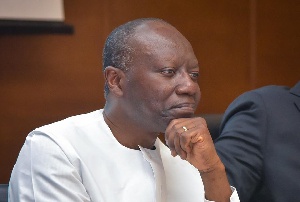 Finance Minister, Ken Ofori-Atta
Finance Minister, Ken Ofori-Atta
Halfway through 2019, government has shown its intent to contain the need for domestic borrowing, as it has so far accepted less debt financing than the amount offered by investors for the year to date, as at July 15, 2019.
Over the past 28 weeks, up to July 15, 2019, government has accepted GH¢24.98 billion through the issuance of cedi denominated treasury bonds and notes, as against about GH¢26.76 billion which was offered by investors.
During the period, government had targeted to raise an amount of GH¢26.19 billion. This is happening ahead of the impending mid-year budget review where a mix of expenditure cuts and revenue-enhancing measures are being anticipated, in response to a higher than planned fiscal deficit during the first quarter of this year, a trend believed – but not confirmed – to have been repeated during the second quarter.
Analysis of statistics from the fixed income market shows that government is settling for less in terms of the domestic debt that it has so far being able to raise from the market than both it originally planned for and what was actually offered This gives the indication that government is containing its need to borrow money. However, it is uncertain whether this is due to lower than expected refinancing requirements or because of cuts in planned budgetary expenditure. Importantly, in the wake of Ghana’s successful US$3 billion Eurobond issuance, the highest to date, in March this year, Finance Minister Ken Ofori Atta declared that government is seeking to increase the proportion of external debt in its public debt portfolio relative to domestic financing. Currently foreign debt accounts for about 40 percent of the mix but Ofori-Atta says government is seeking a balanced mix of about 50 percent for both categories of public debt.
For the first quarter, the period April and May, as well as June to August of 2019, government planned to issue domestic debt securities to the tune of gross amounts of GH¢11,250.00 million and GH¢12,100.00 million and GHc 10,350.00 million, respectively, making up of a total of GH¢33,100.00 million.
However, government is expected to increase borrowing this year, compared with 2018 to fund a higher fiscal deficit, targeted at 4.2 percent of Gross Domestic Product, up from 3.9 percent in 2018 when the GDP itself was lower than that for this year. This would enable the government to increase spending to ramp up infrastructure development and increase funding to flagship economic growth and social intervention programs, while at the same time providing a fiscal stimulus to accelerate economic growth to 7.6 percent of GDP this year, up from a disappointing – albeit sturdy – 5.6 percent in 2018.
Yield Curve
Government’s treasuries for this week depicted that the yield on 91-day bill has inched up marginally to 14.73 percent from 14.72 percent a week before, while that of the 182-day bill stayed at 15.17 percent.
The yield on the one-year note fell to 17.88 percent from 17.92 percent a week before. This suggests that, foreign investors have regained confidence that the cedi’s return to stability is sustainable for now, therefore reducing the need for a yield premium to compensate them for foreign exchange losses.
The Bank of Ghana’s Monetary Policy Committee will next week Monday announce its benchmark Monetary Policy Rate for the next two months.
Following a second consecutive month declined of the consumer inflation, some market analysts are of the view that, this recent downward trend in inflation could boost the confidence of the central bank’s Monetary Policy Committee (MPC) to ease monetary policy at the next meeting, especially since the central bank claims that underlying core inflation – which excludes utility costs – is falling too. However there is a counter argument which points to the 100 basis points cut in the MPR done in January this year as the culprit behind the subsequent sharp depreciation of the cedi which was only stemmed by the boosting in Ghana’s gross international reserves to a long term record high of US$9.9 billion due to the US$3 billion Eurobond issuance done in March .
The MPC is expected to meet next week to review recent developments in the economy to help the BoG position the benchmark policy rate going forward. Ghana’s benchmark policy rate is currently at 16.0 percent and the MPC has the option to cut it further to make credit cheaper, which could increase private sector demand for credit to expand production and enhance overall economic activity; albeit at the risk of making cedi denominated debt securities less competitive for foreign investors who buy up most of the medium to long term government treasury bonds used to refinance maturing public debt and support the budget deficit.